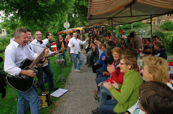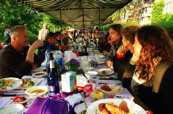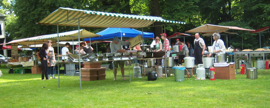Sofie aan de Wallen (organic en vegetarian catering event in the open air)
May 28, 2013
Contributor: Cor Holtackers, Amersfoort
Workshop: Governance, synergies and local systems / Final consumers – General Public – Low-income Households & multi-ethnic communities
Inspiring people to experience and share with 500 citizens a vegetarian, with local sourced organic ingredients prepared diner, at low cost in an informal, natural and attractive setting.



The initial motivation of the organisation of Sofie op de Wallen is based on a community shared meal which is common in some southern EU areas to celebrate together with inhabitants of the village in a yearly traditional event the ‘fruits of the harvest’ at the end of the summer. The organisation of Sofie shows that a vegetarian and organic meal with seasonable ingredients is not only cheap but also tasteful and cheerful, especially if you can share it with a group of people in a green open and natural space garnished with music and entertainment. Local cooks contribute voluntary to prepare the meals and people are requested to bring their own plates, cutlery and drinks with them, which keeps costs of organisation low. This is a very good example to bring people together, show them how tasteful local and vegetarian food can be, and to create a positive atmosphere in which pure and honest food is the ultimate connector.
Pro:
- Be keeping costs low, lower incomes can share a pleasant and affordable meal
- Vegetarian is suitable for almost all cultural and religious target groups
- Social and voluntary involvement of organisation and participants
- Preparing 500 meals without meat and sources local and in season is a good contribution to CO 2 emissions
- People are encouraged to cook meals at home without meat
- Informing people on where to find local food producers
Contra:
- A yearly event, not embedded in daily use of food
- A lot of effort for the organisation to source enough local ingredients for 500 meals
It is easier for countries and cultures with a good embedded food culture to develop these kinds of events, because food culture is part of their identity.
Question: How can we learn from countries and cultures with a strong food culture to develop and encourage the importance of local and seasonal food in their daily lives and not only during a yearly event?